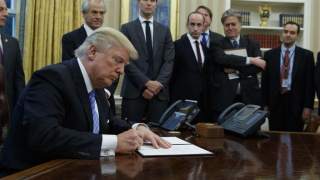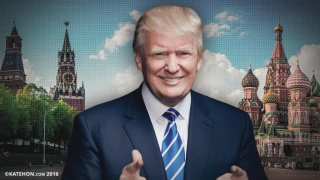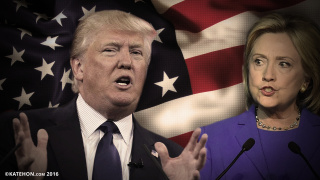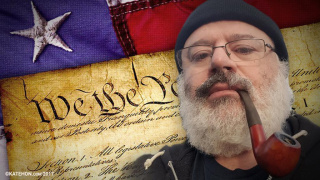Financial Support For Trump And Harris Shows Who Is Behind The US Presidential Contestants
As you know, “whoever pays, dances the girl,” and this is no exception for the US political system. Certain forces are interested in the victory of one or another candidate — some from ideological beliefs, others in order to protect their commercial interests, and the third – in order to keep afloat their participation in the political game.
At the moment, Donald Trump, Vice President Kamala Harris, the Green Party president Jill Stein, independent left-progressive political activist Cornel West, the Libertarian Party candidate Chase Oliver are running for presidency as the registered presidential nominees of the United States. Another 14 candidates, including Joe Biden, withdrew their candidacies. Since other contestants besides Trump and Harris have little chance of winning, we will consider the financial flows into the election campaigns of only these two politicians.
As of September 2024, Kamala Harris is in the lead in terms of total financial assistance, which received 685 million 107 thousand US dollars from its own committees, and 336 million 224 thousand from external sources. Donald Trump received 306 million 777 thousand and 335 million 429 thousand, respectively.
Given that the US political system has the form of a revolving door and an iron triangle of lobbyists, congressmen and voters, financial injections into big politics reflect the interests of big business and the mood in the field of political preferences.
However this particular election season shows interesting changes that have affected some industries and areas.
First, the Wall Street Journal notes that there has been a serious fracture in Silicon Valley between businessmen who previously worked together and were friends. Now some of them support Trump, and the other supports Harris. Some investors have started donating money to political candidates for the first time, because they consider the current situation to be quite dangerous and consider it their duty to send some funds to the election headquarters.
That said, there are certain intricacies – there are different positions on particular issues within the same party. For example, deep-pocketed crypto titans have pumped $10 million into an advertising and election campaign to support Democrat Adam Schiff, seen as being more friendly to crypto, in the primaries, which led to the defeat of Democratic Representative Katie Porter in California’s Senate primary.
A pro-crypto super PAC, Fairshake, has amassed a war chest that now totals around $75 million to spend on US elections. Backers include Coinbase Chief Executive Officer Brian Armstrong, Cameron and Tyler Winklevoss — founders of the digital-asset exchange Gemini — and Marc Andreessen of Andreessen Horowitz.
This is due to the fact that this industry has its eyes on legislative proposals aimed at combating illicit finance as threatening their interests.
Two bills, one backed by Warren and Republican Senator Roger Marshall, and another introduced by Senators Mark Warner, Jack Reed, Mitt Romney and Mike Rounds, would aim to apply anti-money laundering rules that currently exist for banks and other financial institutions to crypto firms. Groups like the Blockchain Association and the Chamber of Digital Commerce have said the current bills would impose unworkable requirements and effectively kill the industry in the US.
Therefore, J. D. Vance’s pre-election rhetoric regarding cryptocurrency (after all, he himself worked in this field) may attract a part of the crypto business in the United States to his side (and Trump, respectively).
On the other hand, some of the IT businesses, where Democrats were preferred, are afraid of Harris’ too “progressive agenda”, for example, Mark Pinсus, co-founder of the Zynga a mobile social gaming company, said that he would support Harris only “if she promotes a centrist platform,” but would refuse if she “turns left.”
Some extravagant investors, such as Elon Musk, who publicly supported Trump, also set an example for other less confident startups in which side to take in the presidential race.
Another interesting trend within the United States is a decrease in the activity of lobbyists. If last year there were 12939 of them and the total amount of funds that passed through them amounted to $ 4.27 billion, then this year, with the number of 12176, the amount of funds was almost half as less – $ 2.2 billion.
Although lobbying as such cannot be completely tied to the presidential or congressional elections, there is still a certain correlation.
You also need to take into account changes in preferences. For example, the Koch Brothers are well-known Republican donors. Especially after Obama’s victory, they began actively financing various campaigns against the Democrats. After David’s death, his brother Charles continued to donate for political purposes, the main funds went through the Americans for Prosperity Action. As of August 6, 2024, this fund has spent about $62 million to support Republican candidates and $10 million to oppose Trump in 2024.
Despite promises to go beyond the parties and cooperate with the Democrats after the election of former President Donald Trump, no funds were allocated to support the Democrats during the 2024 cycle. Billionaire Reid Hoffman (co-founder of LinkedIn) gave $250,000 to a super political action committee supporting Republican presidential candidate Nikki Haley, but later began to support the Democrats. It is significant that there have been several other billionaires who have historically donated money to Democrats, including Jamie Dimon of JPMorgan Chase & Co. and investor Bill Ackman, at the end of 2023, expressed support for the former governor of South Carolina.
It should be noted that Hoffman often donated money to Democratic shadowy groups, including the Hopewell Foundation, a non-profit organization run by Arabella Advisors, which is called a “secretive dark money scam.” Arabella Advisors has spent more than one billion dollars to promote Biden to the White House in 2020.
In general, the sources of money for Democrats and Kamala Harris are less well known than the donations that went to Republicans and Donald Trump.
Kamala Harris was immediately supported after her nomination for president by Bill Gates’ wife Melinda Gates and financial speculator George Soros, while his son Alex Soros tweeted his support, calling on Democrats to “unite around Kamala Harris and defeat Donald Trump.” Netflix co-founder Reed Hastings, who initially expressed doubt about Harris, later donated $7 million to a political action committee supporting her. And IAC Chairman Barry Diller promised to donate “maximum“ to Harris’ presidential campaign, saying that ”anyone who doubts Kamala Harris’ political experience should pay attention to how she perfectly handled every step after Biden’s withdrawal.”
Donald Trump’s main sponsor was Timothy Mellon, a descendant of the famous industrialist Andrew Mellon. He has pumped over $165 million into the 2024 election, making him the top donor fueling outside spending groups this year. Mellon is known as a “guardian angel donor,” a term given to contributors who are a political group’s top donor and account for more than 40% of the group’s funding.
Mellon has a more classic business, and his interests coincide with Trump’s old and current program to revive the US industry.
The ten largest fundraising committees have more Republican structures than Democratic ones. The following joint political action committees work for Trump: Trump Save America JFC, Trump 47 Cmte, Trump National Cmte JFC. Republicans are also investing in Protect the House 2024, Team Stand for America, Grow the Majority JFC and Team Scalise. Behind the Democrats are the Harris Victory Fund, Harris Action Fund and Jeffries Victory Fund.
As of September 22, there were 2,386 organizations registered as super political action committees in the United States, and $2,444,651,566 passed through them.
Trump is supported by the conservative Make America Great Again Inc, Preserve America PAC, America PAC (Texas), Right for America, while the liberal direction is represented by WinSenate PAC, Protect Progress, Last Best Place PAC, Women Vote!, LCV Victory Fund (the most significant in the list).
It should be added that the general data of the funds and those that went to the election campaign differ, since the functions of super political action committees also include discrediting opposition candidates and other types of black propaganda.
However if you look at the political priorities of corporations, it immediately catches your eye that IT companies, the entertainment industry and pharmaceutical companies are more on the side of Harris, whereas the military-industrial complex, air carriers and heavy industry prefer to finance Trump. As of September 2024 Trump’s main donors were American Airlines (134.1), Walmart (83.9), Boeing (82.7), Lockheed Martin (69.5), United Airlines (67.7), FedEx (61.9), Wells Fargo (59.4), Johnson & Johnson (57.4), Brown & Brown (56), Southwest Airlines (55.8), Northrop Grumman (52), Raytheon (43.3), Costco (43), Inter & Co. (42.8), Morgan Stanley (41.7), Microsoft (41.7), GEO Group (41), Delta Airlines (37.5), General Motors (32.7), Home Depot (31.4). And for Harris, Google (1,464,2), Microsoft (743), Brown & Brown (324,5), Johnson & Johnson (239,3), Apple (225,3), Oracle (218,1), Wells Fargo (169,2), Nvidia (169), Boeing (137,5), Morgan Stanley (136,9), Netflix (125.9), JP Morgan (117.7), Inter & Co. (117.2), Accenture (113.1), Adobe (98.2), Amazon (98.1), Facebook (97), Broadcom (93.3), Pfizer (93.1), Disney (91.4).
As you can see, Google has become the most important donor by a wide margin from other companies. And the fact that some firms have invested in both candidates is a normal practice for the United States, confirming the well-known saying there – “you can’t put eggs in one basket.” In other words, some corporations want to be safe, because there is no clear understanding of the trend of who will win in future elections.
Indeed, political scientists note that this year, due to a number of objective reasons, it is very difficult to predict which of the candidates will win the elections. Therefore, financial injections and manipulations will actually take place until the very vote counting process.











